#Wish meta
Text
So I saw Wish today and … Encanto is going to stay my favourite Disney movie for the foreseeable future.
But I want to talk about the wishes, because I've seen people on here saying that they're lame or vague or just silly. And I kind of agree with that, but I also think it's part of the point.
Take Sabino's wish. He wished to inspire people, apparently with his mandolin playing. We don't know if he wished this when he was 18 or whether he arrived in Rosas later in life and gave up his wish then. But given Magnifico and Amaya don't look very old, I'm guessing they are both older than they look thanks to sorcery, so they could have been ruling since before Sabino was 18. So for the rest of this post I'm going to assume that's the case.
So when Sabino was 18 the dearest wish of his heart was to inspire people with his mandolin playing. And then he gave this wish to Magnifico for safe keeping and forgot all about it. His mandolin's probably been gathering dust for the last 82 years.
Yes, this is an excessively vague wish. But the movie knows that. Magnifico says it: inspire them to do what? And although you can argue he shouldn't use this as a reason not to grant the wish, he's also not wrong.
And this kind of wish? It's the kind I think the creative team would have made themselves. Think about it: they work for Walt Disney Animation Studios, that world-renowned dream factory. I assume they're happy to be there and have passion for the work they do. If you'd asked them at age 18 what they wanted out of life, they'd probably have told you they wanted to be artists, animators, writers, composers ... that they wanted to make art (of some kind, maybe movies, maybe not) that entertained and inspired people. Now imagine someone taking those ambitions away from them, so that they forgot what they even wanted. Would they be making Disney movies now? No, they wouldn't have bothered going to film school or learning animation or whatever they did to get to where they are today. They'd be doing something far less interesting, probably. I imagine them imagining that kind of alternate life and seeing it as a nightmare.
The tragedy of the situation is not that Sabino never had his wish granted. (He still doesn't have it granted in the movie. He just gets to remember what it is.) The tragedy is that by giving it up and forgetting about it, he lost the chance to make it come true by his own efforts. He doesn't regain that chance for another 82 years. That's a long time to live directionless and lacking the drive to be what he once truly wanted. I wonder what he did in the meantime. We know very little about his life, and I do think that's a missed opportunity.
What we got instead was Simon. He's the only one of the teenage posse to be over 18. His friends know that giving his wish to Magnifico changed him, and not for the better. He's become boring (and perpetually sleepy, which might be a sign of depression stemming from his lack of direction in life). His friends don't seem to know what his wish was, but it's not clear whether he just never told them or whether Magnifico's magic made them forget as well. Simon is there to show us what it (theoretically) does to someone when they lose the memory of their wish. I say theoretically because the kingdom still seems to be functioning pretty well, and most people seem unaware of the negative side effects of forgetting one's wish ... but I suppose these things are necessary for the story to work.
This actually reminds me of Delirium by Lauren Oliver, a YA dystopia series where, on reaching adulthood, everyone has a surgical procedure that "cures" them of the ability to love. Afterwards they enter loveless arranged marriages, put in the work to bring up their children purely out of duty, and spend their working lives in jobs they have no passion for, assigned to them by the government. The only people who see anything wrong with this are those who haven't had the procedure yet, or on whom it didn't work. The protagonist is a girl who accepts the system until, not long before she's due to have the procedure, she falls in love. I never finished reading that series, but one thing I liked about it was how it made the effort to show what a society without love could look like and how it could work. Wish could have done with more of that sort of thing.
The woman who has her wish granted? She wants to make the finest clothes in all of Rosas. Since she's going to make them herself, I'm not sure what will make them the finest; does her talent get a magical boost? Isn't that cheating? What's the point of being the best at something if you're not the one doing it? So yeah, I think that wasn't particularly well thought out. They had to show it happening once so we could see what it looked like, but they probably could have picked a better example. (In Encanto, they similarly had to show what it looks like when a child gets a gift the way Mirabel didn't. But they picked a good example: Antonio, who gets the gift of speech with animals, plus a magical room that's a forest full of animals, and who loves this, and immediately makes friends with a bunch of animals who hang out with him for most of the rest of the movie, and spends his time trying to use his gift in ways that might help people, including in ways that affect the plot. For example, his gift is the reason why the rats can rat out Bruno.)
Remember, the wishes don't all get granted at the end. Mainly, people get their wishes returned to them, so they can remember what they were and do their best to make them come true, if they still want to and still can. The queen doesn't grant that woman's wish to fly, but she does introduce her to a man who dreams of building flying machines.
And so what if they're the dorky wishes of teenagers? That's also part of the point. Without their wishes, everyone's development is arrested.
I could complain about how someone really should have seen the problem with this before Asha did, but I need to get off the internet and have dinner. This post is already longer and ramblier than I intended, but never mind; right now I wish for some food, and I'd better make it happen and not forget about it.
14 notes
·
View notes
Text
The most heartbreaking lyric in Wish
Magnifico should've been redeemable.
It would've been perfect. The song At All Costs already shows how much he genuinely cares (if in a misguided way)--and if that weren't enough, his loving wife and his community-oriented ambition (he made a kingdom where he doesn't charge people rent??) underlines the good he had in him.
And then there's lyric in This Wish (Reprise)
We were all confusing your promises for protection
But we know what we'vе gotta do
Hope unchanging, with our wish held high
The way you'vе always taught us to
The townspeople are singing this to Magnifico. By the values he taught them (your wishes are good, important), they stand up to the monster that he's become. Excellent segue for him, not only to be defeated, but to get a glimpse of clarity of what an impact his original generosity and selflessness made.
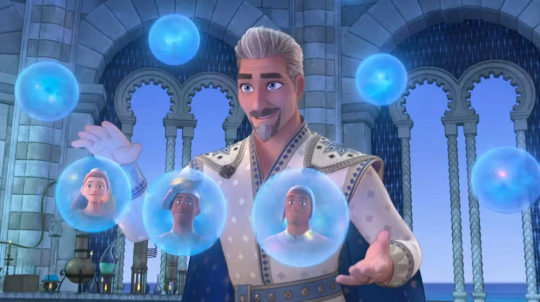
5 notes
·
View notes
Text
Batfam: ghosts aren’t real.
Danny, having been trying to explain that he’s the dead boy to them or 3 hours: *pulls sleeve up and sticks out arm*
Danny: Find. A. Pulse.
Batfam: Danny, how is this—oh my god where is your pulse?
#Batfam: you are not dead you a a meta with ghostly powers#danny: I fucking wish!#Danny: maybe id have rights if I was a meta!#Batfam: wait—#dp x dc#dc x dp#dpxdc#danny phantom#dcxdp#danny fenton#dp x dc prompt#dp x dc crossover#batfam#dc x dp prompt
6K notes
·
View notes
Text
If you haven’t seen Wish yet and you love Disney, do not go see it. I am telling you now. It is ripping out the hearts of the Disney movies you love and then waving their corpses around as if celebrating those hearts.
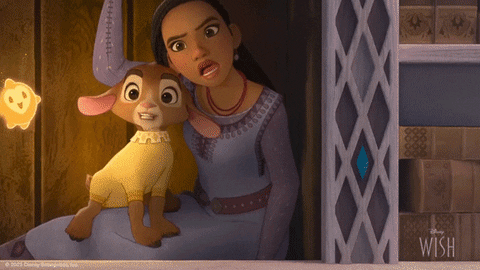
I’ll explain why, again: the message of Wish? Awful. Anti-Disney.
But they've been doing this for a long time. Saying one thing with their movies, and saying another with their PR and Disney Parks Soundtracks.
I'll explain.
Main Idea of Disney's Wish (and the You Are the Magic theme park song and merch): "The power to make your wishes come true is in you."
≠
Most Disney Movies' Idea on How to Have Wishes: "Do what's right, (trust a higher power) and something even more wonderful than what you wished will happen."
Don't try to argue with me about this. You have to look underneath the slogans and the sweater designs and the song titles to what the stories actually support to acknowledge this.
Because you can’t say “do what’s right” has power unless you answer the question “who gets to decide ‘what’s right?’” (Which, coincidentally, is a question Wish brings up and then doesn’t answer.)
Audiences of Disney used to accept that wishing on a star was much like prayer; there’s something you long for, and it’s out of your hands, but you wish for it and you do what you know is right in the meantime. And you’re not crushed, you’re not downhearted, because somewhere in your mind you trust that the combo of those two things—wishing on a higher power and diligence to do what’s good—will be what makes your wish come true.
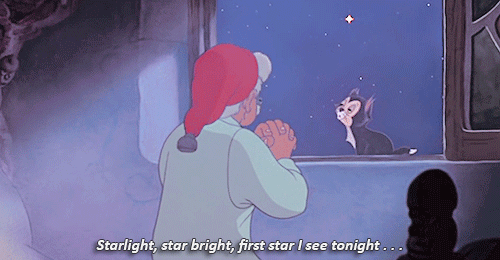
Trust in a higher power—COMBINED WITH:
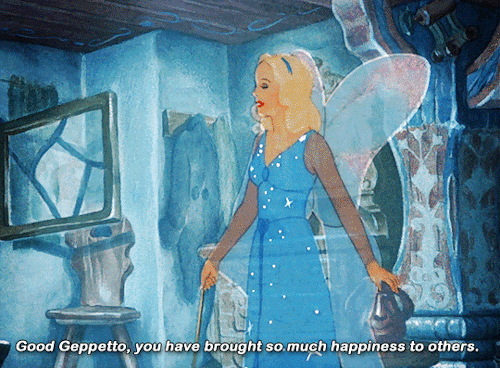
—diligence to do what’s good.
The Blue Fairy (higher power) gave Geppetto his wish specifically because he had demonstrated commitment to do good, whether he got what he wanted or not.
The Fairy Godmother (higher power) gave Cinderella her wish specifically because she kept on being kind and good to low creatures like mice and wicked stepsisters, whether she got what she wanted or not.
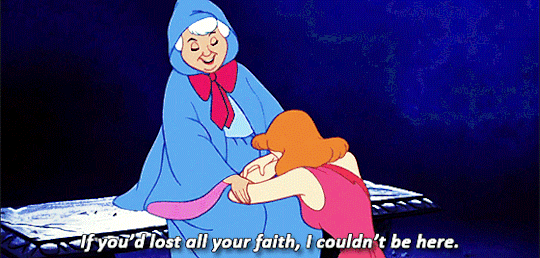
Do you know why that combo (higher power + diligence to do good) is impactful? Timeless? Important?
Because it’s selfless. You want something, but you’re not going to sacrifice doing the right thing to get it. You’re not going to focus so hard on making what you want a reality, on your own, that you miss out on things that could be more important than what you want. And, you’re not so self-focused as to believe that if you don’t do it, it won’t get done.
Jeez, that’s the whole point of The Princess and the Frog!

Tiana wishes to have her own restaurant, and she believes that only her own hard work will grant that wish. She misunderstands her dad’s advice before he dies. She isn’t willing to trust a higher power combined with her own diligence to do good—she only trusts her own ability.
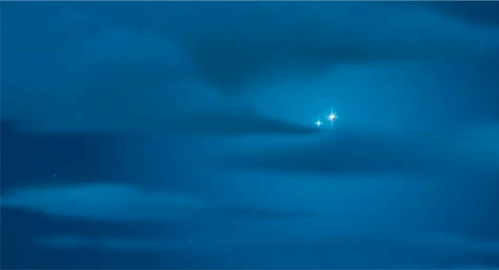
It’s not until she realizes that Ray, the character of faith, was right all along that she learns—what she wished for was too self-focused. It wasn’t complete without love. Something bigger than herself. And getting that was never going to happen just based on her own hard work.
But you know what? It was never going to happen just by a “higher-power” flavored shortcut, either. Because Facilier offers her her wish if she’ll just trust him, no hard work needed. But what does she say?
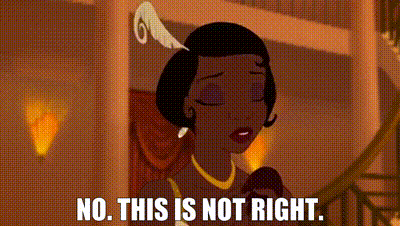
Trust in a higher power + diligence to do what’s right = selflessness, and getting more than you could have ever wished for. And if your wish is selfish, doing those two things will change your wish into something selfless.
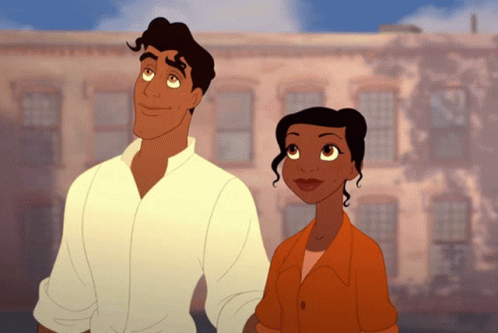
More examples? Get ‘em while they’re hot, in case Wish made you forget, just like the current #NotMyDisney executives have forgotten, what real Disney wishes are for.
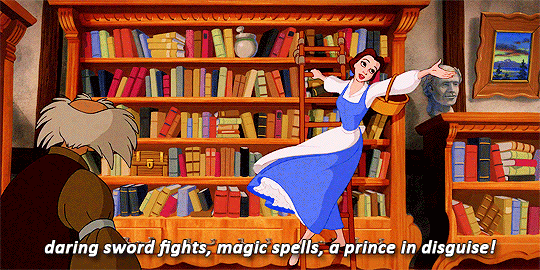
Belle wishes to have adventures in the great wide somewhere--but when she's imprisoned and that chance is taken from her it's not reversed because she worked hard to make her wish come true. It's granted because she gave up her wish for her father: she just did the right thing, regardless of her wish. And in the end, she does get what she wished for, which is adventure in an enchanted castle...and much more, because she gets true love, a throne, and a castle full of friends.
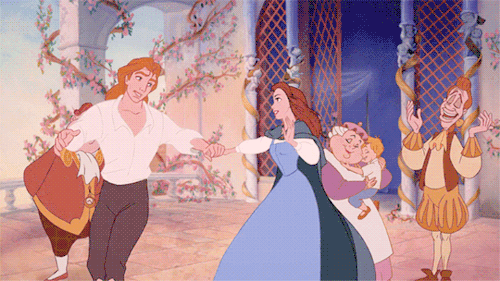
How about the One Who Started It All? The one Wish is failing to pay genuine tribute to?
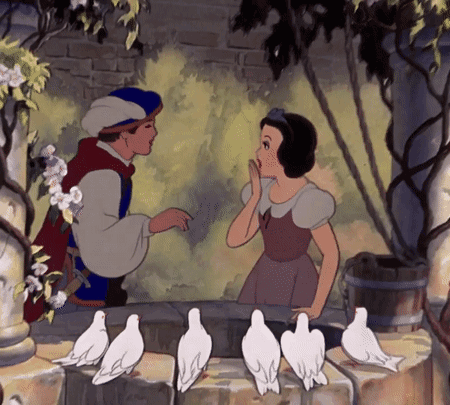
Snow White wishes for someone to love her, and he does--but when they're separated, she does not exercise power to make The Prince come back to her. Instead, she loves who she can where she’s at—the Dwarfs. In the meantime, she has faith that he will keep his promise, and that pure trust in a higher power outside of her control is a big contributing factor to why the Dwarfs come to love her, and learn from her...and in the end, even more than she could've wished happens. He does take her to his castle, but she also has seven new friends who also love her, and the Queen is dead. And she didn’t need to use “the power in her” to work harder and get it done. She just needed to not focus so much on herself at all.
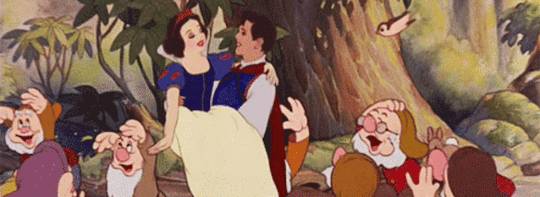
How about a male main character? One who’s wish starts out selfish, but after learning to wish on a higher power and be diligent to do the right thing, gets more than he could wish for?
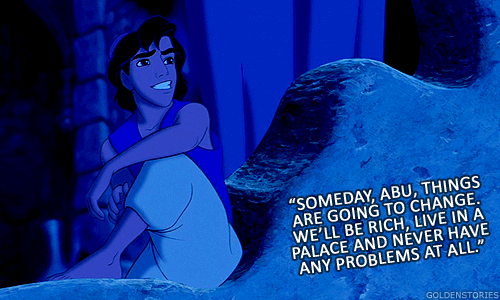
Aladdin wishes to be somebody different (somebody he believes Jasmine could love, somebody who lives in a palace and is respected and “never has any troubles at all.”)—but doing everything in his own power for that wish proves that it was selfish all along; so he switches to doing the right thing, regardless of if his wish comes true, and he gets even more than he could’ve wished. He gets real love with Jasmine, he gets his friend Genie, and he gets to be free from feeling “trapped” because he doesn’t have to hide who he is anymore.
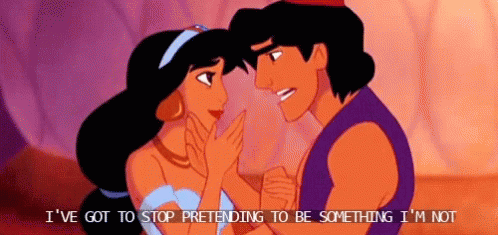
Or Simba?
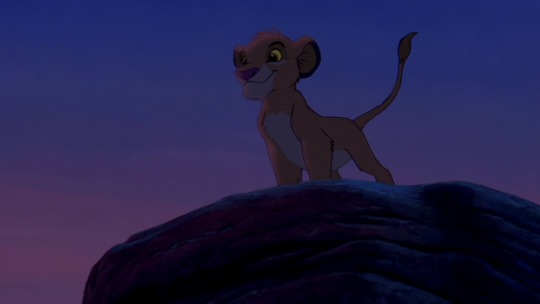
Simba wishes to get to do whatever he wants as King—but when Mufasa dies and he’s convinced it’s his fault, it isn’t for that wish that he goes back to Pride Rock to confront his past and his Uncle. It’s because he had an encounter with a higher power—his father—that helped him to realize his wish was selfish all along. He gives up the selfish wish, and he goes back to take his place as king, not so he can do whatever he wants, but so that he can take self-sacrificial responsibility that comes with ruling. And because he just does the right thing, finally, he gets more than what he wished for.
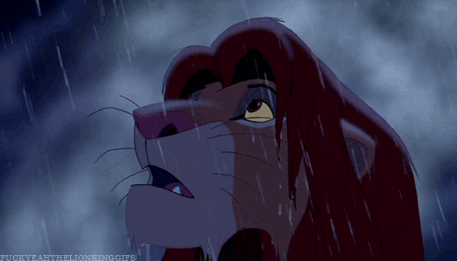
How about something more recent? Zootopia.
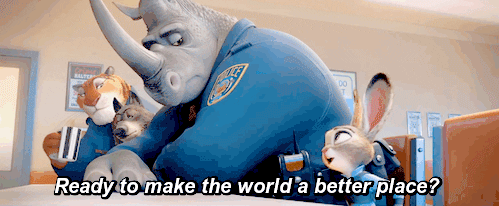
Judy wishes to make the world a better place by proving she can be what she wants to be and catching bad guys—but when she tries to make her wish happen on her own, in her own abilities, she fails and is forced to realize that she should’ve been looking for help by understanding “bad guys,” like Nick. It’s only after she humbled herself, admits she’s wrong, and changes her wish from “proving I can be what I want and catching bad guys” to “proving that understanding each other makes the world a better place” (much less self-focused) that her wish comes true—and so much more. She does make the world a better place, and she does get to catch bad guys, but she also gets to befriend one who was a good guy all along, and become all-around more effective at her dream job.
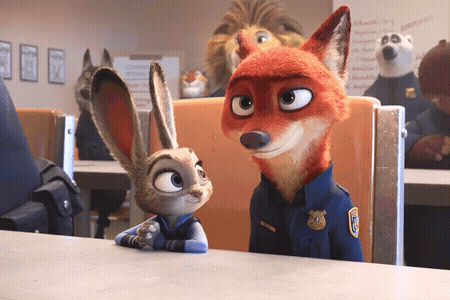
This is how Disney always has been. Because it’s at the heart of good storytelling, and even life (not to get too dramatic.)
The power is not in you. Because it’s not about you. Self-sacrifice, faith, and doing the next right thing regardless of if you get your heart’s fondest desire is what makes more than just your wishes come true. And there has to be belief in a higher power to make that message powerful.
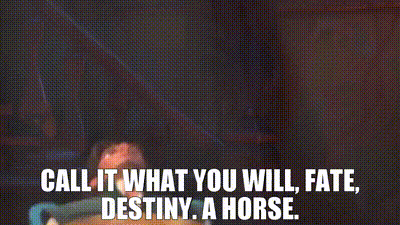
But Wish?
Not only is it bad at showing instead of telling. Not only is it lazy and soulless.
But it’s characters rip the Star out of the sky and say “don’t wish on this. Wish on yourself, to get what you wish for. You don’t need a higher power. You don’t even need to sacrifice to do what’s good—whatever you do is good, because you are the one doing it.”
That is wrong. That is not true, and it is not powerful. There’s no sacrifice in focusing on or placing your trust totally in yourself, and it undoes every good thing Disney has done up until now.
And it undoes it on the 100th anniversary, and it flaunts Easter eggs of the very things it’s undoing.
#pinocchio#disney#wish#Disney’s wish#wish Disney#Wish#Disney#meta#character analysis#storytelling#the princess and the frog#Disney fan#princess tiana#tiana#Naveen#Dr. Facilier#disney villains#asha#king Magnifico#Valentino#queen Amaya#ariana debose#chris pine#Cinderella#classic movies#film analysis#animated movies#animation#wish 2023#Aladdin
4K notes
·
View notes
Text
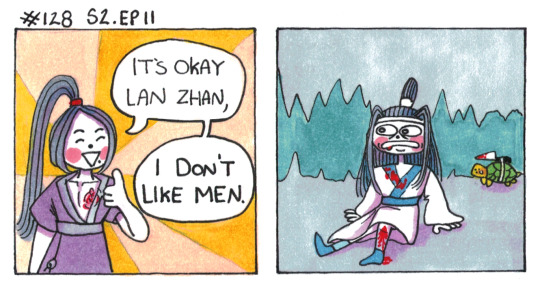
His palms are sweaty, knees weak, arms are heavy.
[First] Prev <–-> Next
#poorly drawn mdzs#mdzs#wei wuxian#lan wangji#tulu xuanwu#blood#Vomit on his sweater already; mom's spaghetti#I love drawing teenji because he gets to be a lot more expressive than Older Lan Wangji.#wwx is trying so hard to be supportive and it keeps backfiring for lwj.#“There's no way I would ever want you carnally ^_^” meanwhile the guy who wants him carnally is losing his mind in agony.#Hot tip if you keep finding yourself in Lan Zhan's shoes: consider being more obvious. Give up on trying to be subtle with an ADHDer.#His game is SO BAD. Abysmally bad rizz. I do not think it was possible for these to to have a chance to get together in this life.#He has no plan. He has no healthy outlet for his feelings. He is looking at his half naked crush and losing his shot.#F in the chat for Lan Zhan. He's just been accidently rejected and he is about to be accused of being straight.#Meta commentary moment: I am going to try very hard to be more consistent with outfits and details across comics#I have had some...difficulties in the past with forgetting details (COUGH the vermillion mark COUGH)#New year new goals! Wish my ADHD eyes and brain good luck!
1K notes
·
View notes
Text
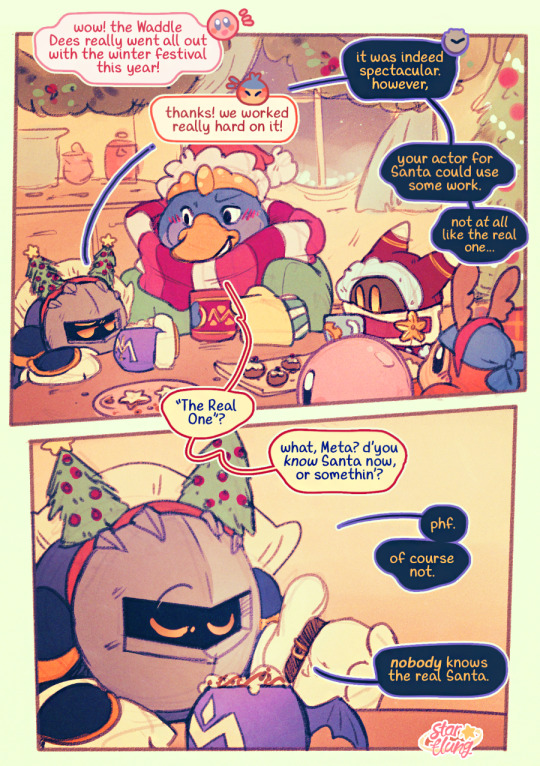

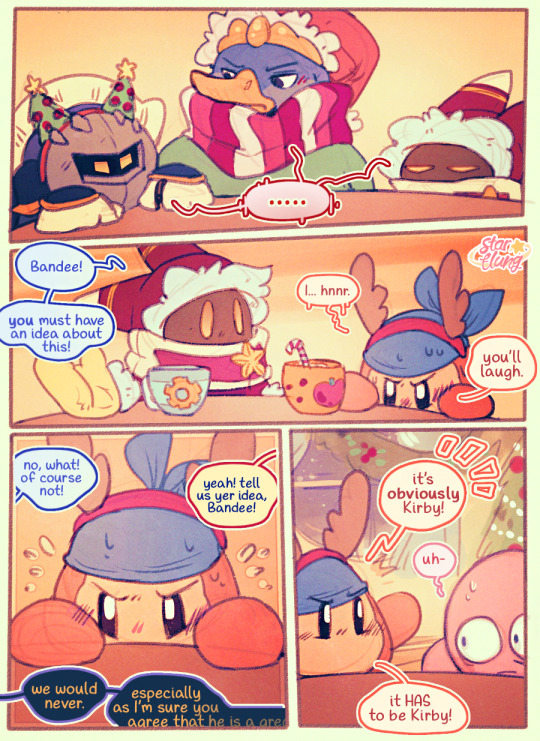
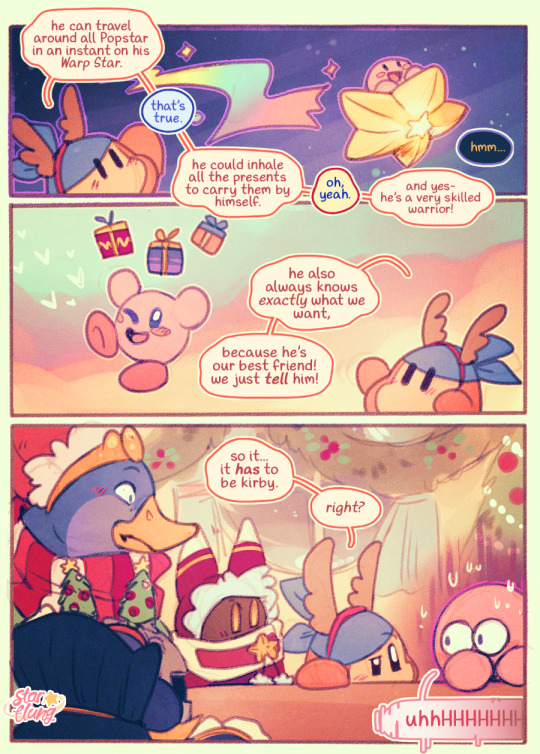
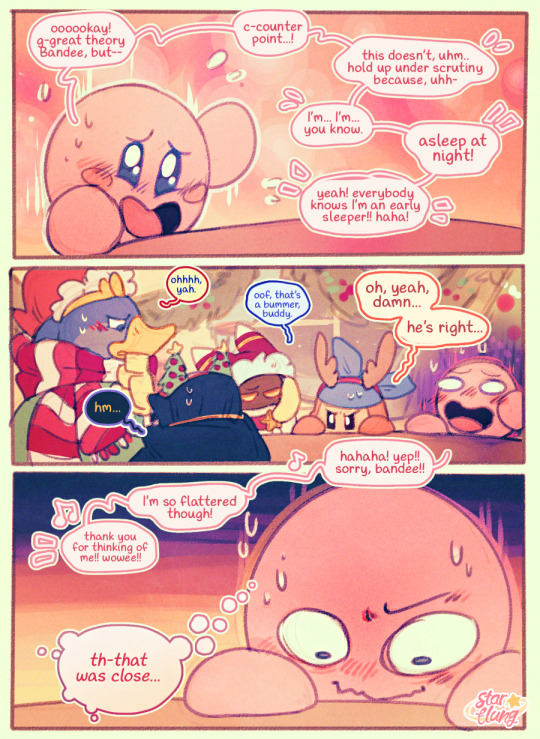
alas, it seems the christmas mystery shall remain unsolved 🎁 happy holidays!
#running a little late on this one but i was determined to get it out this year!!!! i hope you'll enjoy it nonetheless!#there was an additional page i had to cut where kirby bid them all farewell; smacked the wall; and a whole workshop of stuff fell down#but it proved too clunky and too hard to capture within my time limit so you'll just have to imagine it 😂#also this is featuring my festive designs from the advent stickers i did this year!#finally i get to draw boggle eyed kirby and V-face meta knight. christmas present to myself.#happy holidays and best wishes to everybody for the new year!#kirby#bandana waddle dee#meta knight#king dedede#magolor#my art#my comics
1K notes
·
View notes
Text
reminder that the only reason the "ADHD is actually demigod BATTLE STRATEGIES" and "dyslexia is DEMIGOD BRAINS HARDWIRED FOR ANCIENT GREEK" things exist in the PJO universe is because it's a very direct reference to early 2000s teaching/parenting techniques for neurodiverse and disabled children, which aimed to frame childrens' disabilities and hardships as a "superpower" or strength so that the children would feel more positively about their disabilities or situations. This technique has fallen out of favor since then for the most part since more often than not it just results in kids feeling as though their struggles are not being seen or taken seriously.
Yes, demigods are adhd/dyslexic (and sometimes autistic-coded) in the series. This is extremely important and trying to remove it or not acknowledge it makes the entire series fall apart because it is such a core concept. Yes, canon claims that their adhd/dyslexia is tied to some innate abilities, which is based on an outdated methodology. It's important to acknowledge that and understand where it comes from! But please stop trying to apply it to other pantheons in the series like "oh, the romans have dyscalculia because of roman numerals!" or "the norse demigods have dysgraphia for reasons!" - it's distasteful at best.
A better option is to acknowledge the meta inspiration for why that exists in the series, such as explaining potentially that Chiron was utilizing that same teaching methodology to try and help demigods feel more comfortable with their disabilities and they aren't literal powers. In fact, especially given Frank, there's implication that being adhd/dyslexic isn't a guaranteed demigod trait, which means it's more likely to be normally inherited from their godly parent/divine ancestor as a general trait, not a power, and further supports the whole "ADHD is battle strategy" thing being non-literal. It also implies the entire greco-roman pantheon in their universe is canonically adhd/dyslexic - and that actually fits very well with the themes of the first series. The entire central conflict of the first series fits perfectly as an allegory about neurodiverse/disabled children and their relationships with their undiagnosed neurodiverse/disabled parents and trying to find solutions together with their shared disability/disabilities that the kid inherited instead of becoming distant from each other (and this makes claiming equivalent to getting a diagnosis which is a fascinating allegory! not to mention the symbolism of demigods inheriting legacies and legends and powers from their parents and everything that comes with that being equivalent to inheriting traits, neurodiversity, and disabilities from your parents).
anyways neurodiversity and disability and the contexts in which the series utilizes representation of those experiences particularly during the 2000s symbolically within the narrative is incredibly important to the first series and the understanding of what themes it means to represent. also if i see one more "the romans have dyscalculia instead of dyslexia" post in 2023 i'm gonna walk into the ocean.
#pjo#riordanverse#percy jackson#analysis#meta#adhd#dyslexia#also this symbolism recontextualizes the relationship between demigods and their godly parents so much#particularly Percy and Poseidon and the whole ''I'm sorry you were born thing'' like DAMN that's an ENTIRE DIFFERENT IMPLICATION#honestly in general the first series' meta analogy of being a demigod as symbolism for being neurodiverse/disabled ROCKS SO HARD#that's SO COOL and im SO SAD NOBODY EVER TALKS ABOUT IT#i could write a whole essay on that alone like COME ON GUYS#can we PLEASE ACKNOWLEDGE THIS I WANNA TALK ABOUT THE COOL DISABILITY METAPHORS....#anyways i didnt proofread this cause. re: dyslexia so if it doesnt make sense dont worry about it#i can try to explain further in supplementary posts if people so wish
2K notes
·
View notes
Text
GOD there’s something so tragic about how all the horrors Ed fleetingly alluded to in s1 were so, so real. They were passive references, even sometimes jokes, when everything was bright and silly and hopeful. But when the lens is shifted everything takes on a new weight.
I mentioned it before but I can’t stop thinking about this line: “these past few weeks have been the most fun I’ve had in ages…years…maybe ever.” Ed meant that with his whole heart!!! His fall is all the harder because he was the highest up he’d literally ever been.
It’s just wild to think of the framing of this show because typically comedy implies that these characters live in a consistently comedic universe but it really is just that one blip in time up until this point. Ed and Stede’s solo stories are inherently tragic and yet when they come together they create a shared comedy universe. The meta use of genre in this show makes me CRAZY
#i actually need to stop thinking about this show I simply don’t have the time#I can’t though :)#some things are too powerful even for adderall to handle#which speaking of I really wish I could give Ed some#ofmd#ofmd season 2#ofmd s2 spoilers#ofmd spoilers#our flag means death#edward teach#ofmd meta
2K notes
·
View notes
Text
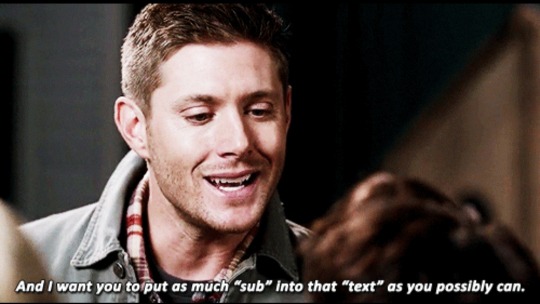
this is dean directly speaking to us with the fanfiction writing power and living outside of the narrative he's trapped in, asking us to do what chuck and the cw don't allow him to have
#spn#spn 10x05#fanfiction writing#destiel fanfiction#fanfic writing#fanfiction#dean x castiel#deancas#destiel#spn meta#supernatural#fanfic#spn fandom#dean winchester#like it's a direct plea#he wants us to create destiel fanfiction#notice how the camera is placed like he's diectly speaking to US in the girl's place?#spn writers who tried doing it are speaking through dean's words#dean the character is asking us to let his dreams come alive outside of the narrative he's can't escape from#and us... we're just gonna have to keep making his wish come true#let's keep writing pals#dean wants you to write destiel fics#he told us
2K notes
·
View notes
Text
"i have crossed the face of the universe; i poison it to match my grief" is one of the rawest lines in Nona the Ninth. there's like a whole thesis in here but Varun just says it so plainly, and it's so human. because that's what Cytherea did! that's what John is doing! that's what Kiriona, in all her rage and grief and loss of everything she ever had, has fallen down the path of. that's Alecto, the fury of unceasing anger. that's the cycle of abuse!!!
#question for AtN: WHO is going to break free?#nona the ninth#tlt meta#varun the eater#john gaius#kiriona gaia#rotating this. wish i was more articulate but hey it's like 1230am
2K notes
·
View notes
Text
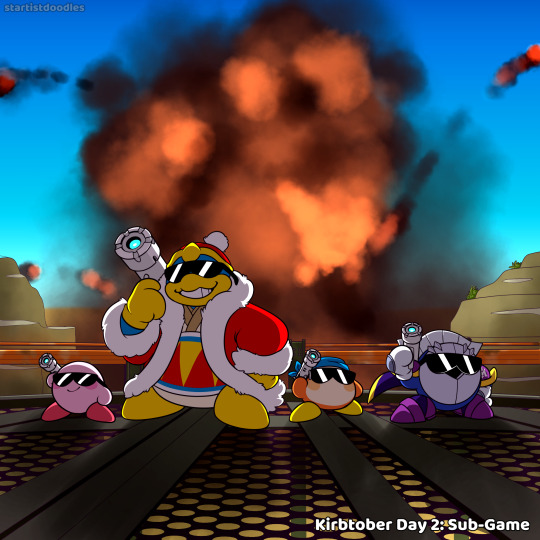
Kirbtober Day 2: Sub-Game
#kirby#kirby (character)#king dedede#waddle dee#bandana waddle dee#meta knight#kirbtober#my art#wish scope shot made it into rtdldx u_u still sad abt it
1K notes
·
View notes
Text
I’m a firm believer of the idea that the writers had to get Cas and Dean to stay away from each other as much as possible in season 9, especially after everything that happened before, during, and after their time in Purgatory—like Goodbye Stranger, for example—because if they stayed together, destiel would’ve already been canon.
So just imagine if Gadreel wasn’t a dick who was being used to keep them apart, and they let Cas stay inside the bunker. Cas is human, complete with fresh, new, and intensified human desires. Who’s also canonically in love with Dean, by the way. As for Dean, that motherfucker literally almost confessed in season 8. They wrote an entire subplot about Cas being brainwashed with the intention of breaking him out of it by having Dean confess his feelings towards him. By telling him he loves him.
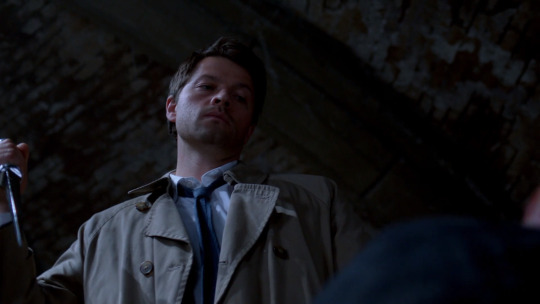
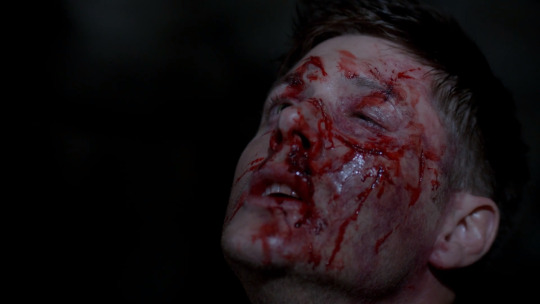

Do you fucking see where this is headed towards?? THE natural progression of these events??? That the writers had set up and trapped themselves in?????
Human Cas safely staying in the bunker with Dean would’ve been such a perfect environment for more intimate moments between them. And they couldn’t risk that. Dean having to guide Cas through mundane, day-to-day human things he never had to deal with before literally sounds like the plot of a cheesy romantic series I’ve seen. Which makes me wonder about what the hell took place between the night Dean stayed with and took care of Cas after their fight against Ephraim, and the morning when he drove Cas back to work. That was one of the few moments in that season where they could be alone together. And also something that they chose to skip over.
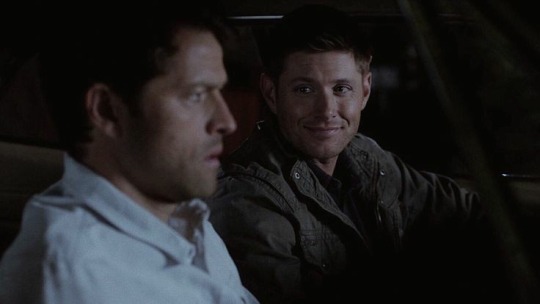
#AND THEN THEY TRY TO TELL ME ITS UNRECIPROCATED????#well#anyway#my hc is that that’s when they watched tombstone together :)#which they both thought wasn’t a date but wished it was#maybe that’s why Cas didn’t immediately rememeber it in s13.#because he didn’t have perfect memory as a human#but he eventually does when Dean mentions the fact that he made him watch it#god I wanna draw them so bad#imagine the tension#thinking thoughts#destiel#destiel meta#deancas#casdean#dean winchester#castiel#dean x castiel#dean is bi#bi dean#spn#supernatural#queernatural#goodbye stranger#heaven can’t wait#tombstone#spn 8x17#spn 9x06#spn 13x06#reiotalks
1K notes
·
View notes
Text
argo's on twitter now and he identified these previously unknown precinct 41 officers

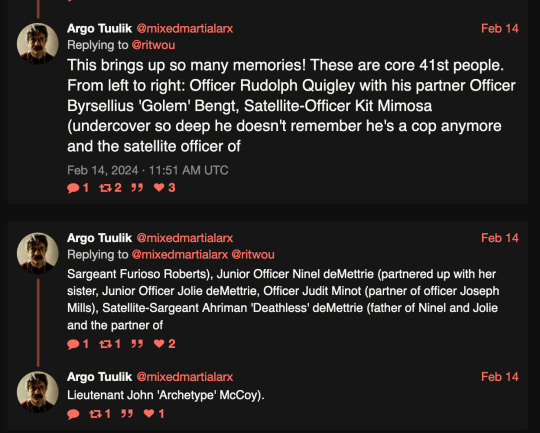
text of tweets:
This brings up so many memories! These are core 41st people. From left to right: Officer Rudolph Quigley with his partner Officer Byrsellius 'Golem' Bengt, Satellite-Officer Kit Mimosa (undercover so deep he doesn't remember he's a cop anymore and the satellite officer of Sargeant Furioso Roberts), Junior Officer Ninel deMettrie (partnered up with her sister, Junior Officer Jolie deMettrie), Officer Judit Minot (partner of officer Joseph Mills), Satellite-Sargeant Ahriman 'Deathless' deMettrie (father of Ninel and Jolie and the partner of Lieutenant John 'Archetype' McCoy).
#i don't have a twitter account anymore but i do feel compelled to see what's going on sometimes#if you're on there send argo some well wishes#i'm sure he could use it#disco elysium lore#de meta#disco elysium#precinct 41
572 notes
·
View notes
Text
aziraphale's relationship with heaven vs crowley's relationship with hell in S2 serves as this beautiful, heartbreaking metaphor for the choice that so many queer people with unaccepting - and in many cases abusive - families find themselves forced to make.
crowley has made the leap. he's cut himself off, and when they've tried to stay in touch or even bring him back, he's always resisted. "we're better than that, you're better than that!". in a way he's been through it before - he was rejected by heaven, and so it makes sense to him to take the opportunity to reject hell on his own terms. it doesn't come without consequence, of course. so many queer people find themselves having to suppress their identities until they're financially independent - cut to crowley living in his car. but he's made the choice, and he's free to do his own thing now.
aziraphale, at the start of the season, is also more or less completely separate from heaven; we know from crowley "they don't talk to him anymore", and he's not making any effort to get in touch with them. but then when they ask him to come back, they manipulate him again. the metatron offers him coffee and then tells him "i've ingested things in my time, you know" - a world away from gabriel's "why do you consume... that?". he's assured that the things which he thought made him too... different, too not-good for heaven, are in fact okay.
aziraphale was finally living his own life, far away from them, and doing the things he enjoyed, the things that they always shamed him for. but now he thinks, maybe he can go back and this time they'll accept him - it doesn't have to be like it was before! he's changed and maybe they have too, and if they haven't then maybe they'll listen to him! he can show them how to be better, he can make a difference. he isn't yet ready to face the reality that he can never be the person (well, angel) that they want him to be, not without losing sight of what makes him him. he might wish he could bring himself to say no, to cut them off, but he can't do it. because despite it all, he still has hope that they can change. and of course he does - years of trauma have told him time and time again that they're the good guys, after all. so he thinks, if they can't change, then who can? if they can't accept him, who will?
#good omens#meta#i guess??#aziraphale#crowley#ineffable husbands#queer#queer stuff#transgender#the more i think about it the more queer coded stuff i find in GO and it's incredible#crowley's choice is the one i wish i could make but here i am aziraphale-ing my way through#good omens meta#good omens analysis#good omens s2#neil gaiman#terry pratchett
1K notes
·
View notes
Text
Disney doesn't need to change "the formula." That's the last thing that Wish proves.
What Wish proves is that "the formula" only works when you know why the ingredients are in it, and you use them the correct way.
The Princess Character is meant to wish for only half of the movie's message, and go through an adventure that teaches her what the other half is; what her dream was missing. Ariel dreamed of understanding but she was missing love. Tiana dreamed of achieving her goals but she was missing faith. Jasmine dreamed of freedom but she was missing trust. Belle dreamed of adventure but she was missing being understood.
The Villain is meant to highlight the opposite of the movie's message. Jafar gets what he wants through trickery and manipulation; that's the opposite of Aladdin's "truth will set you free" message, and he gets imprisoned in a lamp. Scar thinks being a King is having his way all the time and can't learn from his past of living in Mufasa's shadow; that's the opposite of The Lion King's "Let the past remind you of your responsibility to selflessness." Gaston loves only himself and is always obsessed with appearances; that's the opposite of Beauty & the Beast's "true love is found within a heart of self-sacrifice." That's what makes them such good villains. (and that clear direction is what drives good villain songs, since Magnifico's is what everyone is talking about)
The sidekick is supposed to compare/contrast with the main character's qualities. Abu is a greedy thief, which is what everyone in Agrabah thinks Aladdin is; when he scolds Abu and teaches him selflessness, it shows us who Aladdin actually is. Flounder is easily frightened and looks at the glass half-full; when Ariel coaxes him and leads by example, we see her bravery and positivity reflected in Flounder's tiny character arc. Timon & Pumbaa do whatever they want all day just like young Simba always dreamed of; when Simba goes to live with them, he finds that "getting his way all the time" makes him forget who he really is and feel empty.
The setting is supposed to show off the characters and highlight the movie's message. Rapunzel's tower is designed to be pretty on the inside because of her influence; if it were too dark and prison-shaped, we'd wonder why she didn't work up the courage to leave sooner. Just like how Quasimodo has made his corner of the bell-tower beautiful, too; they're taught the world is cruel and they're not strong enough for it, but they make their own worlds beautiful enough to hint that that's wrong right from the start. Ariel's grotto is shaped like a tower with no roof so that she only has one window to the forbidden Surface, and it's the light that comes from that forbidden world into her dark grotto which literally makes her able to see human things differently. Tiana's apartment has no interesting features except her father's picture, a perfectly made bed, a drawer with no extra outfits but stuffed with tip money, and only two dresses; both of which are for work.
None of that is happening in Wish, because they didn't know why the formula ingredients are there. Disney needs to understand and return to the formula the right way; forgetting it was what got them here.
Asha learns nothing to add to her dream, unless you count "the power to grant wishes is in me." Which you shouldn't, because we didn't even know she was confused about that until the animals sang a song that was completely off-topic and she had the chance to jump in and sing "I'm a Star!"
Magnifico does not demonstrate the opposite of Wish's message effectively because his character has nothing to do with a philosophy against making wishes, and everything to do with power. (He is the strongest character in the film. But because the message and core concept of what wishes are are so bad, that's not saying much.)
Valentino, and Asha's friends, do not highlight anything about her character through compare/contrast. Valentino is brave and all over the place. Her friends are seven-dwarfs parodies. Happy, Doc, Sneezy, Dopey, Bashful, Sleepy, Grumpy. None of that contrasts with Asha's vague characterization of "cares too much." None of it compares to that characterization, either.
The setting is empty. There are no interesting details that teach you something about any of the characters. None in Asha's home, none in the neat-and-tidy one-dimensional forest, none in the Rosas square, and none in the bland, empty castle. Magnifico's study is the closest anything gets; there's a loose concept that all of Asha's friends have to work together to open the roof, and take a leap of faith to weigh the pulley system down. Unfortunately, none of these characters is shown struggling to work together, OR to take leaps of faith, at all, before this point.
The ingredients of the formula are in Wish. They're just not being used correctly. This is how not to use the formula; it's not the formulas fault. If it ain't broke. They should never have let people convince them to try and fix it.
#Disney#critic#wish#wish 2023#wish hate#Disney's wish#Disney criticism#wish Disney#get it together Disney#real Disney#realdisney#notmydisney#Mulan#Tangled#The Little Mermaid#The Lion King#Aladdin#Meta#writing#writing advice#Disney princesses#Princess critiques#the Disney formula#formula#character analysis#animation#set design#Rosas#Magnifico#Asha
2K notes
·
View notes
Text
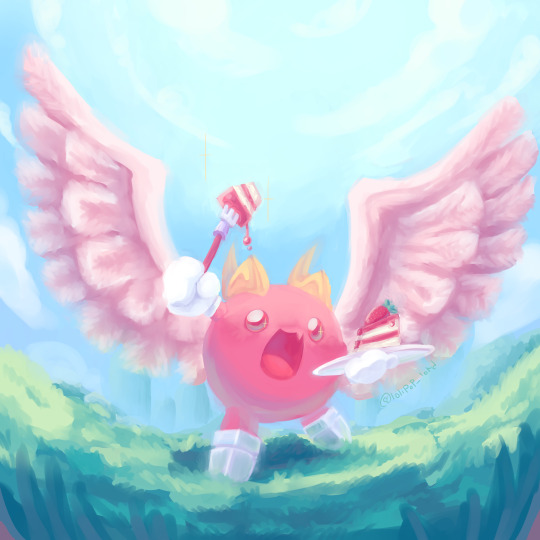
they found the greatest sweets in the galaxy!!
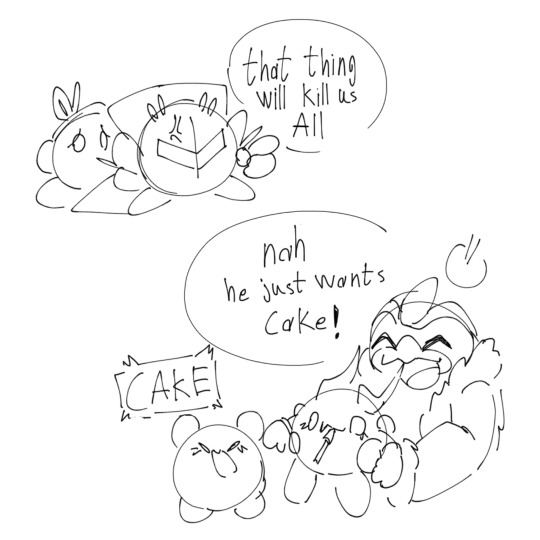
this is basically the plot of my comic lol
#kirby#kirby fanart#kirby fandom#galacta knight#meta knight#king dedede#galacta is my boi and i will die for himp!!!#i wish i could paint more but man it takes so long and i barely have time to draw
379 notes
·
View notes